Summary: A new study reveals that infliximab, an anti-inflammatory drug, can improve motivation in patients with depression and high inflammation. Researchers found that patients receiving infliximab showed greater effort in reward-based tasks, correlating with changes in brain activity in key motivation regions.
The results suggest that inflammation may play a role in motivational deficits seen in depression. This research highlights the potential of targeting inflammation as a treatment for depression-related motivation issues.
Key Facts:
- Infliximab improved motivation in depressed patients with high inflammation.
- Brain activity in motivation-related areas increased after infliximab treatment.
- The study links TNF-mediated inflammation to motivation deficits in depression.
Source: Emory University
A new study published this week in Molecular Psychiatry by Emory University researchers has revealed a promising new avenue for treating motivational deficits in patients suffering from depression.
Motivational impairments are a core component of depression and have long been linked with poor treatment outcomes, diminished quality of life and heightened suicide risk. Growing evidence suggests one potential cause of low motivation may be persistent inflammation, which suppresses activity within key circuits in the brain.

This study is the first of its kind to examine the effects of infliximab—an antagonist of inflammatory molecule tumor necrosis factor (TNF)—on both behavioral and brain markers of motivation in a group of 42 medically stable, unmedicated depressed patients.
Importantly, the study focused on patients who were not only depressed, but also exhibited evidence of high inflammation as measured by C-reactive protein (CRP) greater than 3 mg/L. CRP is a blood test commonly available in clinics and hospitals throughout the United States.
The research team believed that for some patients with depression, the addition of high inflammation might play a key role in their experience of lower motivation.
Patients were randomly assigned to receive either a single dose of infliximab (a potent anti-inflammatory medication used to treat rheumatoid arthritis and other inflammatory conditions) or a placebo.
Over two weeks, researchers assessed changes in the patients’ motivation using a variety of methods, including an effort-based decision-making task, self-report questionnaires and functional magnetic resonance imaging (fMRI) to observe brain activity.
Patients who received infliximab demonstrated a greater willingness to exert effort in pursuit of rewards compared to those who received the placebo. This increase in effortful behavior was closely tied to a reduction in signaling pathways directly targeted by infliximab, particularly TNF.
Furthermore, these changes were reflected by alterations in brain activity within key regions associated with motivation, such as the dorsomedial prefrontal cortex, ventral striatum and putamen, as well as the functional connectivity between these areas.
“This is the first study to reveal the impact of an anti-inflammatory drug on brain circuits related to motivation,” says first author Michael Treadway, Ph.D., professor of psychology at Emory University.
“It’s exciting to see how modulating inflammation can directly influence motivation, one of the most challenging symptoms to treat in depression.”
Importantly, the study found the relationship between infliximab treatment and improved motivation was mediated by the observed changes in TNF signaling and brain activity. Furthermore, reductions in motivational deficits were associated with heightened responses in a brain network sensitive to reward.
“These findings build on growing evidence that anti-inflammatory treatments hold promise as a novel approach for addressing motivational deficits in depression,” says senior author Andrew Miller, professor of psychiatry and behavioral sciences at Emory University School of Medicine.
“By targeting inflammation, we’re not only addressing the biological underpinnings of these deficits but also offering new hope for more effective treatment options.”
About this depression and psychopharmacology research news
Author: Jennifer Johnson McEwen
Source: Emory University
Contact: Jennifer Johnson McEwen – Emory University
Image: The image is credited to Neuroscience News
Original Research: Open access.
“A randomized proof-of-mechanism trial of TNF antagonism for motivational deficits and related corticostriatal circuitry in depressed patients with high inflammation” by Michael T. Treadway et al. Molecular Psychiatry
Abstract
A randomized proof-of-mechanism trial of TNF antagonism for motivational deficits and related corticostriatal circuitry in depressed patients with high inflammation
Chronic, low-grade inflammation has been associated with motivational deficits in patients with major depression (MD). In turn, impaired motivation has been linked to poor quality of life across psychiatric disorders.
We thus determined effects of the anti-inflammatory drug infliximab–a potent tumor necrosis factor (TNF) antagonist–on behavioral and neural measures of motivation in 42 medically stable, unmedicated MD patients with a C-reactive protein >3 mg/L.
All patients underwent a double-blind, placebo-controlled, single-dose, randomized clinical trial with infliximab (5 mg/kg) versus placebo.
Behavioral performance on an effort-based decision-making task, self-report questionnaires, and neural responses during event-related functional magnetic resonance imaging were assessed at baseline and 2 weeks following infusion.
We found that relative to placebo, patients receiving infliximab were more willing to expend effort for rewards. Moreover, increase in effortful choices was associated with reduced TNF signaling as indexed by decreased soluble TNF receptor type 2 (sTNFR2).
Changes in effort-based decision-making and sTNFR2 were also associated with changes in task-related activity in a network of brain areas, including dorsomedial prefrontal cortex (dmPFC), ventral striatum, and putamen, as well as the functional connectivity between these regions. Changes in sTNFR2 also mediated the relationships between drug condition and behavioral and neuroimaging measures.
Finally, changes in self-reported anhedonia symptoms and effort-discounting behavior were associated with greater responses of an independently validated whole-brain predictive model (aka “neural signature”) sensitive to monetary rewards. T
aken together, these data support the use of anti-inflammatory treatment to improve effort-based decision-making and associated brain circuitry in depressed patients with high inflammation.







